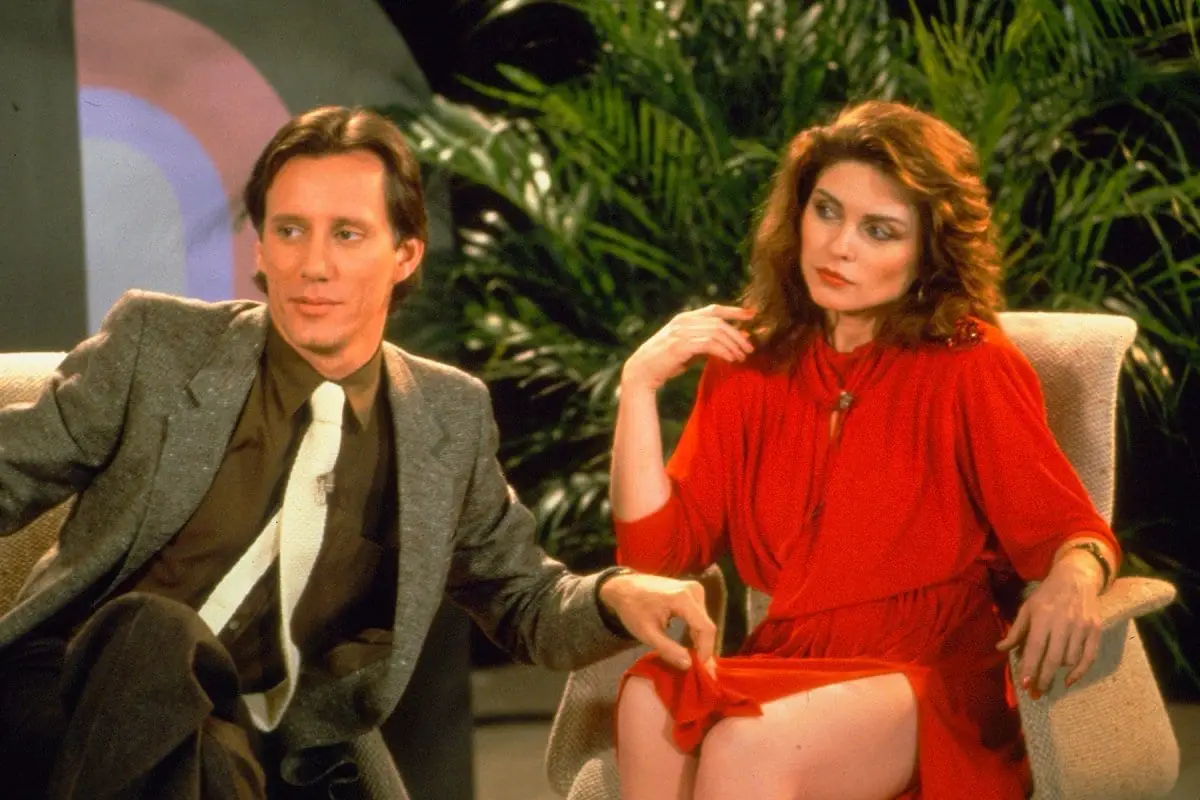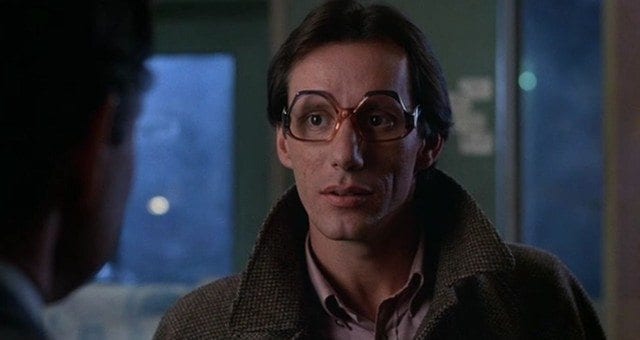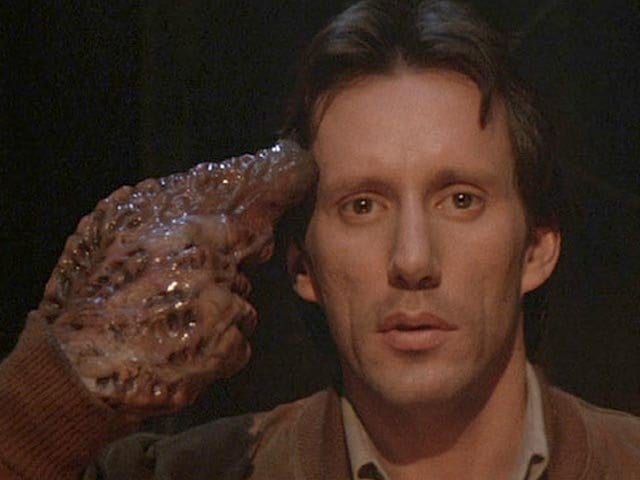By the time Canadian horror auteur David Cronenberg made Videodrome (1983), he already had close to a decade of experience making extremely unsettling horror films, preying on the collective subconscious fears of society like female sexuality and a fascination with the fear of the uncontrollable nature of the human body itself. This particular element became an entire subgenre known as body horror. There have been several great practitioners since, but no one does it quite like David Cronenberg. In the 1970s, early Cronenberg films like Rabid (1977) and The Brood (1979) painted a picture of a very bleak and cold world that mirrored the state of Western culture. All of his films throughout the following decades in and out of the horror genre have served as a sinister reflection; a statement on the many layers of deception in what we perceive to be reality. Videodrome was a bold new vision of surrealistic terror that, like many of his peer David Lynch (Eraserhead, Blue Velvet)’s films, showed the evil lurking just beneath the surface of every day Western life.
Videodrome tells the story of Max Renn (James Woods), a film television producer in 1980s Toronto. Channel 83 has set itself apart from other stations under Max’s fearless leadership, peddling adult films and hardcore violence to an ever-hungry audience. It’s really humorous to see a film that seems to make a direct correlation between violence and art in the bombastic way that David Cronenberg does in Videodrome. During the 1980s, it was a time of mass paranoia and fear. The evening news was often flooded with the latest Cold War whispers and a supposed Satanic Panic. Kids were buying heavy metal records and committing suicide. There was a bit of a mass hysteria brought on by a lot of bad actors trying to make a name for themselves. In many ways, Videodrome feels like a middle finger back at that particular establishment. You want to see what a correlation between violence and art actually looks like? Here it is.

All of the best science fiction acts as a warning as to where society could be potentially headed, and Videodrome absolutely nailed it, unfortunately. The new flesh talked about in reference to Videodrome (videotape) has shed its skin multiple times since the film’s release in 1983, but the outcome is still the same. We live in an increasingly isolated, technological driven society that is making us unhealthier, unhappier, and dumb. As Nicki Brand (Deborah Harry) points out early in the film, constant over stimulation for over stimulation’s sake is simply bad. Videodrome itself is a program within the film that Max’s partners pick up a signal from in their never-ending quest to find the most cutting-edge programming to keep their viewers tuned in. It’s a classic case of ‘be careful what you wish for.’ Max sees that the Videodrome signal is only torture, nothing more than a snuff film. There’s no actors involved, no plot. This is an entirely new level of animalistic impulse. Videodrome’s signal awakens carnal bloodlust in Max Renn. He can’t help himself. He has to know all about it. Max’s insatiability reflects an unfillable void inside of humans that are constantly exposed to television and desensitizing adult films.
Videodrome is a conspiracy theorist’s wet dream. Cronenberg’s work often has many layers of secrets and deception. Just when you think the auteur has been figured out, the film morphs and adapts into something else entirely, making it harder to precisely pin down. Videodrome is certainly no exception. Max seems to be in over his head, obsessing over the Videodrome signal and sexpot characters like Nicki Brand, a woman who teaches Max to blur the lines between pleasure and pain who comes with plenty of secrets of her own. If curiosity killed the cat than Max Renn is screwed. He never saw something he didn’t want to take home as a prize to play with, including Nicki. Max is charming, charismatic, ruthless, and unscrupulous. In other words, he’s a standard television executive.
Videodrome takes a cue from Lewis Carroll (Alice in Wonderland) as Cronenberg plunges Max down a rabbit hole of sex and violence that leads to his own destruction. Like David Lynch, Cronenberg has a way of showing the sinister in the every day and the madness in the mundane. What makes Videodrome so effective is that it starts in a world that feels very much like our own and then slowly pulls the ground out from under Max—and by extension—the audience. Max begins to lose his sense of reality after first viewing the signal caught by his underling at Channel 83. His constant urge for instant gratification and sexual stimulation leads him to an affair with Nicki who opens his world up to more increasingly violent sexual behavior. Or is she? Just how much of Videodrome is actually happening and is fantasy is all up to the viewer. It’s very easy to suggest that Max never even had sex with Nicki. The feelings he has for Videodrome bleed into his own psychosexual fantasies after being interviewed with Nicki and a media guru who only appears on television via a television monitor, Dr. Brian O’blivion (Jack Creley).
As it often comes down to in narrative film, once a Pandora’s box is open, it cannot be closed. It’s just one of the rules. Max can no longer concentrate on his own work and begins to pass over longtime business allies attempting to sell more softcore adult films based on Greek literature like Dionysius. This no longer interests Max. His entire being is obsessed with finding Videodrome. When Nicki vanishes after going to Pittsburgh to be in a new Videodrome shoot, reality begins to completely slip away for Max. Hallucinatory nightmares abound that are all a reflection of the male sexual ego. Whenever Max, who comes off like an affable enough guy, slips into a hallucination it most often involves symbolism, rich with extreme sexual violence toward women. It’s such dark material that it feels wrong to laugh, but Cronenberg is making a satire here.
In one of the best scenes of any film from the 1980s, Max Renn makes love to his own television set that has morphed into a living breathing sexual organism in the guise of Nicki Brand. If that statement about people’s unhealthy sexual attachments to their electronic devices doesn’t play better today than it did in 1983, I’ll eat my hat. Max continues his search for answers, eventually leading him back to Dr. Brian O’blivion and his Cathode Ray Mission. In yet another bizarre scene of insanity mixed with the mundane, the dregs of society line up for O’blivion’s version of a soup kitchen; only no one eats unless they watch a little television. Dr. O’blivion doesn’t speak to people, so he won’t see Max. His daughter, Bianca O’blivion (Sonja Smits) is the one truly running the show as her father only appears in monologue form on VHS cassettes. According to her, he hasn’t spoken a word to anyone in years.

In an even deeper twist that truly takes Videodrome to maddening heights of conspiratorial glee, the titular signal is in fact a new kind of weapon designed by shadowy government operatives in order to keep control and maintain influence over the world. Once the viewer has seen the tape, a tumor forms in the brain that causes hallucinations. Or is it the other way around? Either way, the Videodrome frequency has “a philosophy, and that’s what makes it dangerous” as an old friend puts it trying to warn Max away from chasing it down any further.
In another example of Cronenberg placing the most nefarious individuals and operatives in mundane day-to-day settings, the man behind the curtain reveals himself in an eyeglasses store called Spectacular Optical: Keeping an Eye on the World. Mr. Barry Convex (Leslie Carlson), the human definition of the banality of evil, is a soulless suit that explains Spectacular Optical is a lot like a real megaconglomoration like GE. They have their greedy little fingers in just about every slice of pie imaginable; from eyeglasses to third world countries to weapons manufacturing and everything in between.
These are the people behind the curtains really pulling the strings and running the show. Videodrome revels in that notion that society is being hidden and run by a secret group of elites controlling everything. It may sound like an unhinged rant from the likes of Alex Jones, but David Cronenberg was being partly satirical while also warning about where a technological dependant future could lead the human race. The further in 2019 that we fall into our social media echo chambers and refuse to listen to anything that isn’t brought to us directly from an algorithm based source of information, Videodrome starts to feel a lot less like a horror film and more like a fucked up modern-day Ted talk from Nostradamus.
The Videodrome signal empties out humanity and replaces it with a Manchurian Candidate-like individual who is the ultimate weapon: brainwashed, derelict, and ultimately disposable. Even if someone were to break free of their new programming, who would ever be expected to believe such a story? The power of the Videodrome signal is that a ruling class just found a brand new way to continue using a disposable human being to carry out their dirty work without getting an ounce of blood on their hands. On top of everything, Convex fully reveals his plans after he is sure that Max is fully infected with the mind-controlling virus. It’s a direct indictment of the pearl-clutching conservatives who think that anyone into sex and violence as entertainment must be a depraved individual, worthy of brainwash and reprogramming for such deeds as political assassination. This should surprise no one, as even in 2019 the Puritans still burn all the perceived witches in society. After all, why would anyone watch a scum show like Videodrome? When Convex asks Max this question in true Bond villain fashion, it’s hard not to laugh knowingly with Cronenberg as he pokes at his own audience.
Videodrome is one of the most unusual, unsettling science fiction body horror films of all time. From the opening reel, Howard Shore’s score sets an uneasy Kubrickian tone that settles deep into your bones. The elements of body horror are some of the best in the master of the genre’s entire body of work. Carrying over elements from previous films, Max grows a phallic hole in his chest that pulsating VHS cassette tapes are inserted into, a grotesque hallucination that serves to activate the auditory orders Convex and whoever he is working for wants. At one point, a gun slides into the gaping phallic hole in Max’s chest. Later, when the voices in his head tell him to kill all his partners at Channel 83 as a test run for a larger political assassination, the flesh opens back up and grants Max the gun back. It grotesquely wraps around his hand until it is made one with him in a new kind of bio-mechanical nightmare.

The final act of Videodrome pretty much guarantees that it would never get made today. Max Renn is no longer Max. He is the tip of the spear in Convex’s new army of Videodrome-influenced zombies. He murders all of his partners in cold blood before the voices in his head tell him to go after his real mission: Bianca O’blivion. In a final showdown between now assassin Max and Bianca, she uses the same types of television mind control techniques to break the power that Videodrome has over him. There’s no going back for Max though. The ending is entirely up for interpretation like the rest of the film. Max doesn’t get a happy ending and many would argue he didn’t deserve one, but those are the same pearl-clutchers who brainwashed him in the first place.
Bianca O’blivion reprogrammed him to do her bidding instead of theirs. Once Pandora’s box is opened (as stated before), it’s nearly impossible to close without a bullet to the head…so that’s exactly what Max gets. There are no happy endings to be found in Videodrome, just warnings from an artist that no one listened to that now passes solely for entertainment. But take a look closer, behind the closed door that says ’employees only’ or dare to question a given narrative and the ever omnipresent they just might have something they want to play for you too. Death to Videodrome! Long live the new flesh!



i,ve rarely been as stimulated by an article as much as this one. a little bit deep for me , but that,s cool , i still really enjoyed reading and will be re- reading it a lot. videodrome is a brilliant movie. i disagree totally with your view that the ending is downbeat. it is one of two cronenberg movies where the ending is paradoxically and perhaps dangerously exiting and….liberating.
outstanding stuff, mr. wandling.